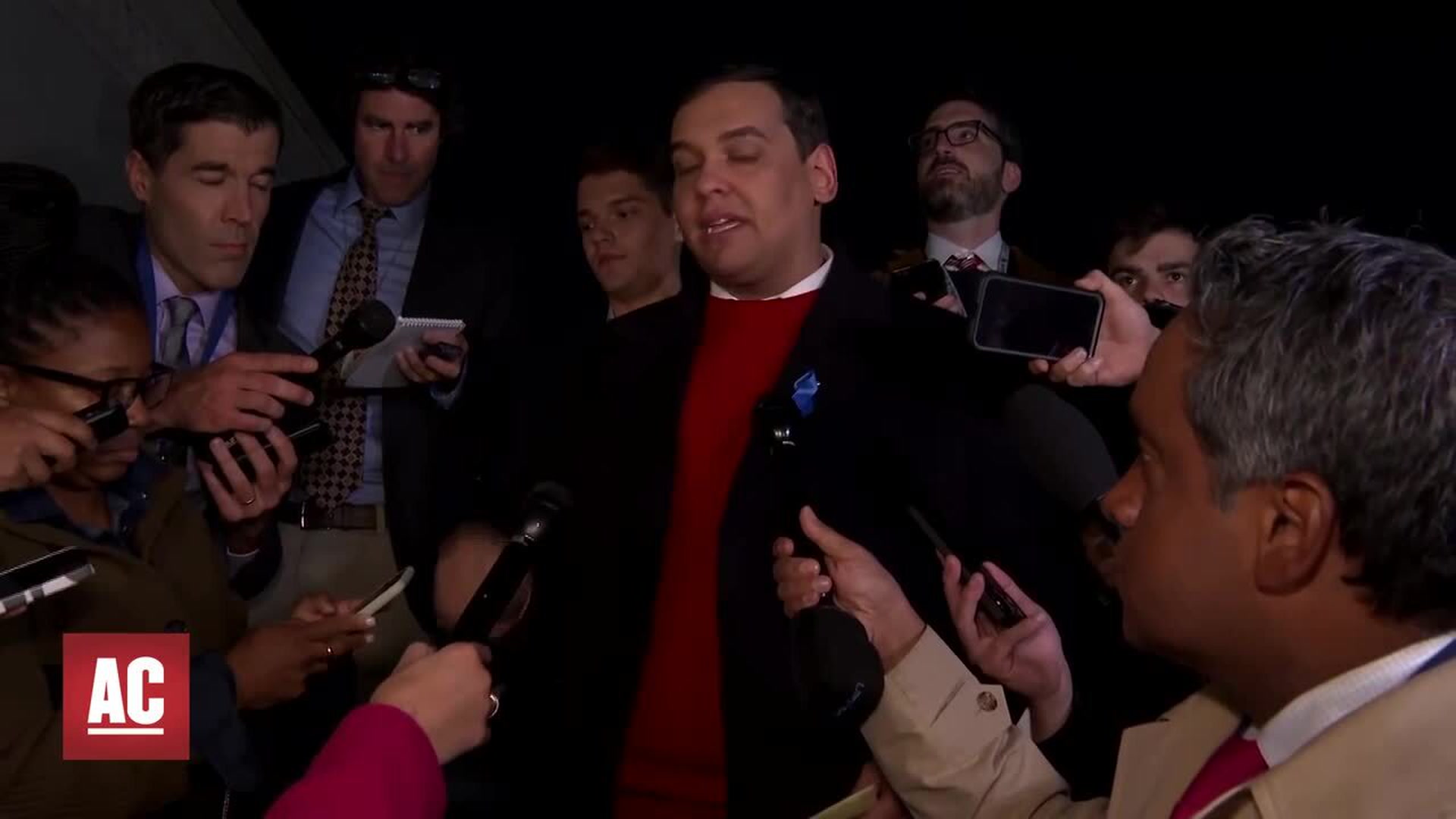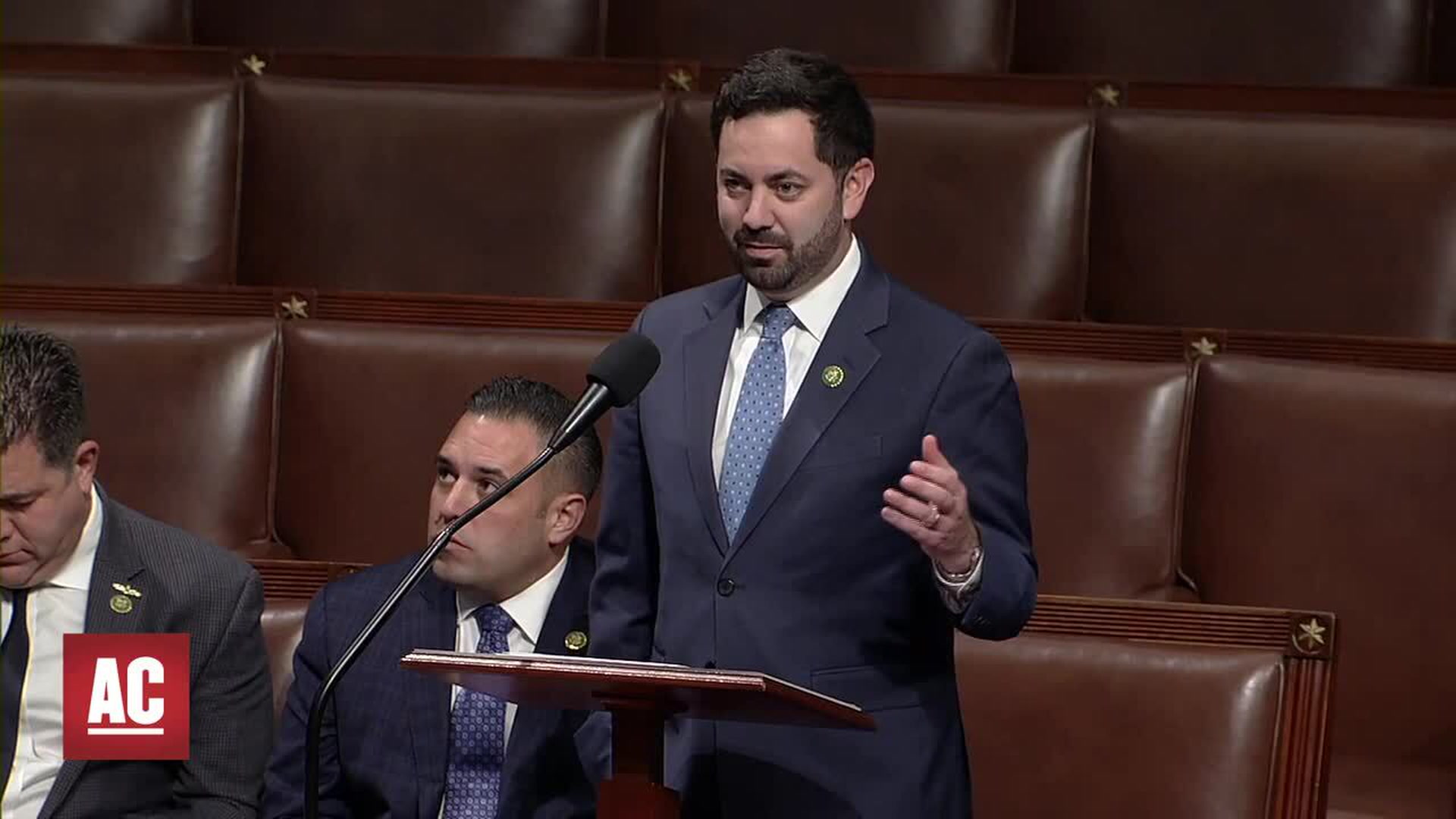The U.S. House of Representatives held a vote on Wednesday evening concerning the embattled gay New York Rep. George Santos, who has been at the center of numerous controversies since he entered Congress in January. Despite the serious criminal and ethical allegations and the Republican-led resolution to expel him, Santos escaped expulsion, retaining his position in Congress for now.
With a vote of 179 for and 213 against expelling Santos from the House and 19 voting present, the results spell a temporary reprieve for the New Yorker. Joining most Republicans who voted against expulsion were 31 Democrats.
The resolution was spearheaded by his fellow Republicans from New York, led by Rep. Anthony D’Esposito. This marked a rare instance of intra-party disciplinary action brought to the floor. However, the motion required a two-thirds majority to pass, a threshold it failed to meet.
Watch: Rep. Santos speaks after failed expulsion effort
D’Esposito and four other Republicans from New York, facing competitive races next year, had sent a letter to their colleagues on Wednesday morning urging a vote in favor of the resolution. They stressed that this was a “moral” issue, distancing from the notion of political maneuvering.
As tensions soared on the House floor, Santos passionately defended his position during the debate, emphasizing the importance of due process and criticizing the attempt to expel him as politically motivated.
With nobody willing to speak on his behalf, Santos sat through multiple rounds of criticism from Republicans and Democrats, the latter including Rep. Daniel Goldman, who previously introduced an expulsion resolution alongside gay California Rep. Robert Garcia. He noted that Republicans who now support expelling Santos didn't support his resolution.
Santos spoke after all others had spoken, save for D'Esposito, who reserved his time to have the last word.
“Mr. Speaker," Santos said. "Efforts taken by other members in this body to act as judge, jury, and executioner are unconscionable and reckless to our Republican system of government and to the integrity of this body. … It is unconscionable to think that this body who is at war with the [Department of Justice] over their politically motivated practices would blindly accept their accusation against a member of another branch of government. … I am proud to have one of the most conservative voting records in Congress in the 118th Congress and the most conservative voting record in New York’s delegation. I will never apologize for voting in line with conservative principles. And my district, let us remember our commitment to justice ensures that the presumption of innocence is upheld in all cases.”
The heated floor debate also saw Santos highlighting his accomplishments in office, claiming to have solved over 1,100 cases of constituent work. He appealed to the chamber to uphold the principles of justice and allow due process to take its course.
Watch: Rep. Mike Lawler makes case for Santos' expulsion
D’Esposito countered Santos’s argument by highlighting the loss of trust among the constituents, stating, “Seventy-eight percent of the individuals who live in the Third Congressional District do not want George Santos as their representative. … This resolution would’ve been put forth by me whether I represent a bright red district or the brightest of blue districts. This is about doing the right thing. It’s about putting this institution first, and it’s about giving the people of the Third Congressional District the opportunity to be represented.”
Among the far-right members of the GOP who supported Santos was vehemently anti-LGBTQ+ Georgia Rep. Marjorie Taylor-Greene, who avoided a censure resolution of her own Wednesday night.
U.S. Rep. Becca Balint, a lesbian Democrat representing Vermont, pushed for a vote on a resolution to censure Greene, known for her extreme remarks. On Thursday, Balint advanced a censure resolution initially proposed against Greene in July, pointing to the Georgia Republican's string of anti-LGBTQ+, anti-Semitic, Islamophobic, racist, and other discriminatory remarks, along with her propagation of conspiracy theories concerning mass shootings and terrorist incidents.
Greene took to X, formerly Twitter, to voice her opposition to the resolution to kick out the admitted liar.
"George Santos is innocent until proven guilty in a court of law," she wrote. "I will not vote to expel him today."
Democratic Rep. Jamie Raskin of Maryland, who voted against Santos' expulsion, voiced his concerns over the potential precedent that such an action might set. He expressed his belief in adhering to the Constitution and the rule of law, emphasizing the importance of due process.
“I’m a Constitution guy," Raskin said in a statement. "The House has expelled five people in our history, three for joining the Confederacy as traitors to the Union and two after they were convicted of serious criminal offenses. Santos has not been criminally convicted yet of any of the offenses he has been indicted for that were cited in the Resolution nor has he been found guilty of ethics offenses in the House internal process." He further highlighted the dangers of expelling members without a criminal conviction or adverse ethics findings, calling it a "very risky road to go down."
Raskin also pointed out the political maneuvering around the Santos issue, mentioning that the same Republicans who are now pushing for Santos' expulsion had defended him in the past for political gain. He concluded by noting the delayed action on the Santos ethics investigation, urging for adherence to due process and the rule of law, and expressing his willingness to vote for expulsion if and when Santos is convicted of the stated offenses.
Santos, indicted on 23 federal counts, including wire fraud, unlawful monetary transactions, stealing public funds, and lying on financial disclosures, has pleaded not guilty to all charges. The indictment details a series of fraudulent financial schemes Santos, 35, allegedly orchestrated during the 2022 election cycle. A revised indictment was filed after his former campaign treasurer, Nancy Marks, pleaded guilty to conspiracy to defraud the United States, shedding light on further alleged misconduct by Santos.
His trial is slated for September 9, 2024.
The new Republican speaker of the House, Mike Johnson, stressed the importance of “due process” during a Fox News segment last week, noting the slim majority Republicans hold in the lower chamber. Prior to the vote, it became clear that without the new speaker’s support, reaching the level of support required to kick a member out of the body would be impossible.
Santos’s political and personal life have been under scrutiny since he took office, not just due to the criminal charges but also because of a series of false claims he made about his own life.
During a contentious interview in February on Piers Morgan Uncensored, Santos admitted to several fabrications, including lies about his education and employment history. However, he continued to defend other contentious parts of his biography, offering explanations that left the host and the audience with more questions than answers.
This pattern of deception, coupled with his serious legal troubles, has led to a dramatic fall from grace for the congressman who once claimed to aim for “overcoming the political red tape of Washington, D.C.”
Despite the legal and political storms surrounding him, Santos wrote on X ahead of the vote to express his resolve: “I will not beg for my constitutional rights. I will let my colleagues make their decision without my interference. God bless you all and God bless the United States of America!”
For his part, Santos remained defiant in victory.
“Tonight was a victory for due process not me,” he wrote on X after the vote. “This was never about me, and I’ll never let it become about me. We all have rights under this great Constitutional Republic and I’ll fight for our right to uphold them till my last dying breath.”
The most recent expulsion from the U.S. Congress occurred nearly two decades ago in 2002, when James Traficant, a Democratic representative from Ohio, was ushered out of the halls of Congress following his conviction on a myriad of serious charges. Traficant’s rap sheet included 10 counts encompassing bribery, conspiracy to defraud the United States, corruption, obstruction of justice, tax evasion, and racketeering.







































































Charlie Kirk DID say stoning gay people was the 'perfect law' — and these other heinous quotes